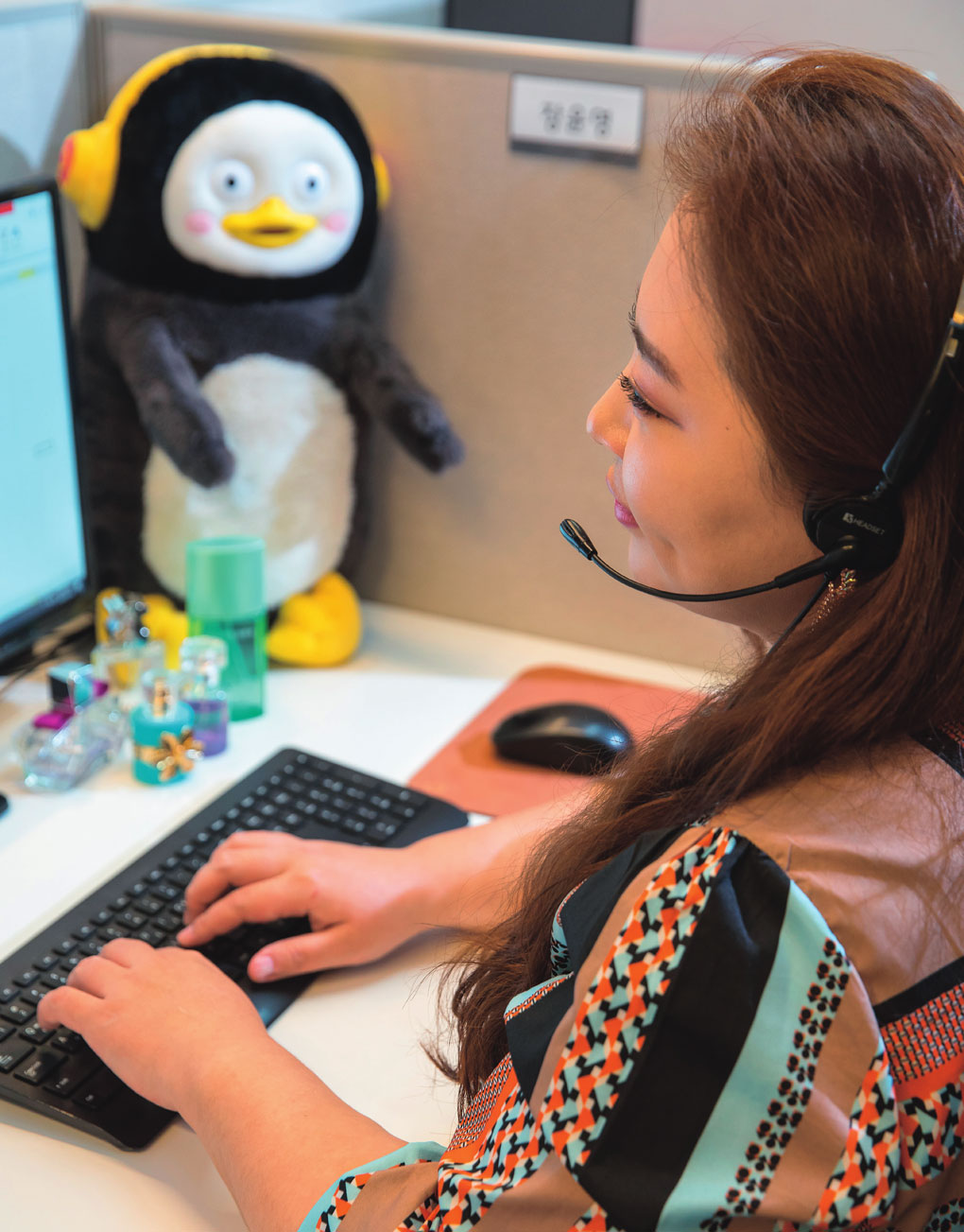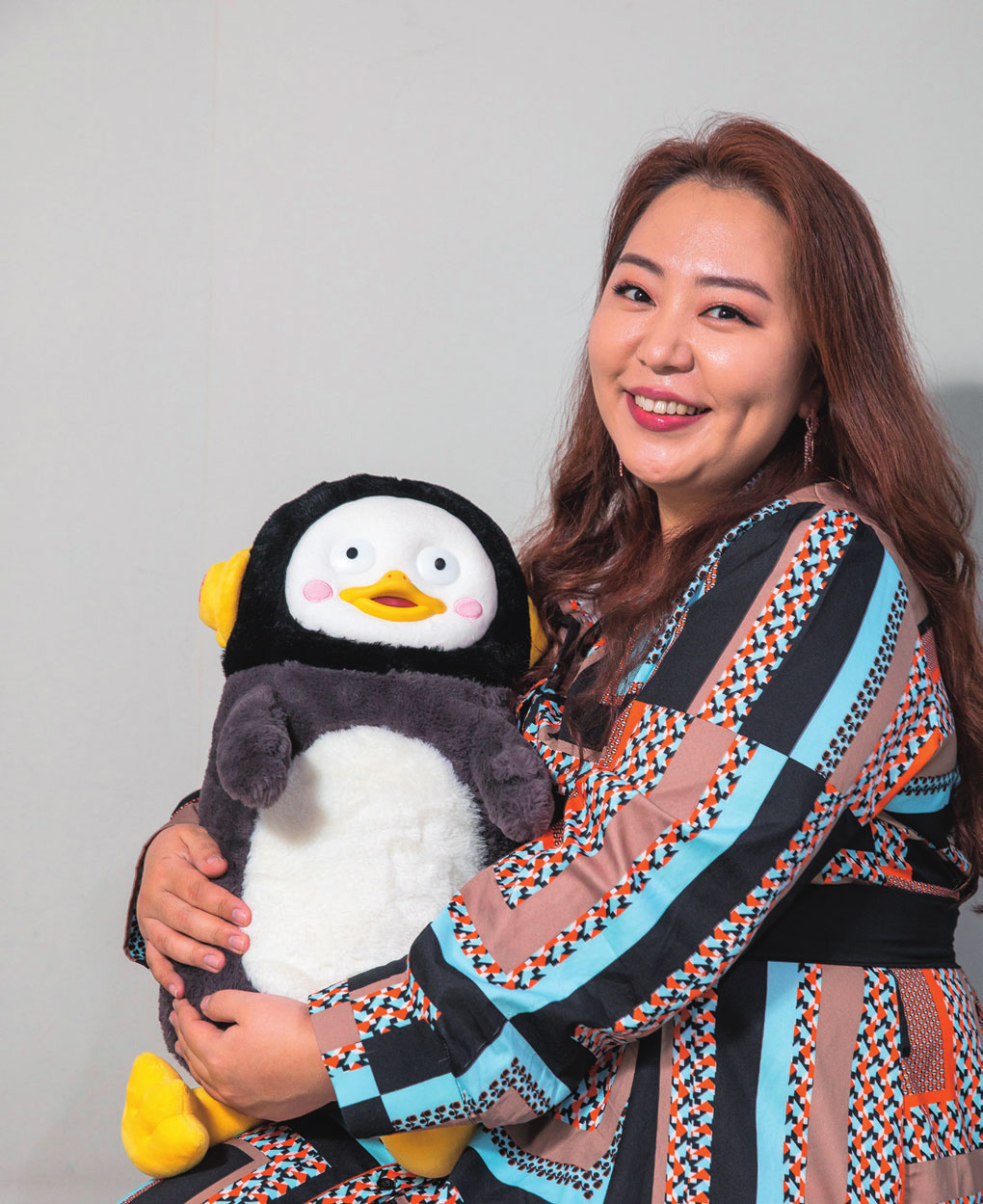Most customers are kind. There are always a few, though, who manage to inflict deep emotional scars with just a few words. Currently in her third year at a customer service call center for a massage chair company, Jang Yoon-young has experienced this firsthand.

Jang Yoon-young speaks to a customer. A call center employee, she assists scores of customers during her 9 a.m. to 6 p.m. workday.
Her morning is precisely choreographed: wake up at 7:40, skip breakfast, leave at 8:20, arrive 25 minutes later, have coffee and prepare. At precisely 9 a.m. the phones ring, without fail.
“Hello, this is Customer Satisfaction Team Member Jang Yoon-young. What can I help you with?”
On an average day, Jang answers 60 inquiries at her Seoul call center and makes 40 calls to tell customers about special giveaway events or relay product safety information. Most of the incoming calls involve delivery time. For massage chairs, this averages seven to 10 days, but to people who have become accustomed to same-day delivery, that may seem like an eternity. For rush requests, she estimates a date and assures that the delivery team will follow up with an exact time, but not every caller is satisfied.
Jang groups customers into three clusters. The majority – 80 out of 100 – eventually accept the delivery situation after listening to her polite explanation. She labels people who listen closely and those who are amicable as “good customers.” About 18 out of every 100 are in her “bad customers” group. Their overriding reason for calling is to complain and they refuse to listen. “Don’t give me that nonsense,” they yell. “Who do you think you’re talking to?” “I don’t want to hear your excuses!” The remaining two out of 100 are the “worst.” These are the ones who spew a torrent of obscenities and shift seamlessly into sexual harassment.
The odds of encountering a bad customer on the first call, at 9 a.m., are very high. Impatience and anger have been percolating for a day or more, ready to be unleashed as soon as the call center opens. Monday mornings are even worse. The usual first callers have been watching the clock all weekend with a shortening fuse. For Jang, Monday mornings could hardly be any further from a pleasant start to a new week.
A Sobering Start

Jang estimates that 20 percent of the people she interacts with on a given day are abrupt and harsh. To deal with the stress, she sometimes writes down her thoughts.
During the noon hour lunch break, Jang bypasses the cafeteria. What she craves most – more than any meal – is a space without voices, a piece of time to herself when she doesn’t have to listen or speak. After soothing her empty stomach with a boiled egg and some soy milk, she tries a quick power nap. In the same way manual laborers need food to replenish their physical energy, service workers require peace and quiet to refill their exhausted emotional reservoirs. It is necessary to recharge for the afternoon shift.
When the call center opened in 2017, it was understaffed and under-equipped. Jang received only two days of training, so she had to rely on more experienced coworkers for correct information. “I know call centers are notorious for having poor working conditions, but I didn’t really feel it that much at the beginning,” she says. That matched her early assumption that working at a call center would be easier than her previous job in pharmaceutical sales. But it soon changed.
A month into her job, she got a taste of what feeds the bad reputation. A customer requested that an order be delivered later, rather than immediately. Jang’s simple question, “When would you like it delivered?” somehow ignited a barrage of verbal abuse and obscenities. In the end, all she could do was put down the receiver after explaining, “Due to your abusive language, it has become impossible to continue your consultation.” Afraid that she would burst into tears, Jang left her desk for a nearby playground, where she sat on a swing and cried for a good while. Years later, she still remembers that voice and phone number.
“Someone who just starts swearing for no reason – those people act that way because that’s how they’ve lived their own lives. They must have solved a lot of things by yelling. So now, they just start right off by yelling and then see what comes next.”
Asked about anything fun about her job, Jang cocks her head to one side and says she can’t recall a single moment. However, there are always a few customers who thank her sincerely and express their appreciation, and that helps sustain her. Just hearing the tenor of a customer’s voice, or even the sound of their breathing, informs her of what to expect, she adds.
As for unhappy moments, she responds with a sigh. “There was a customer once who said they turned their massage chair on without realizing their little dog was sitting in it. Tragically, it was too late to save the dog. And I’ve received requests to move massage chairs from the homes of elderly parents to the homes of their children. I assume this is because the original owners have passed away. Once, a delivery driver got on an external platform to assure a customer that it would be a reliable way of moving a chair up to a high-rise apartment. And then, there actually was a fall.”
During the noon hour lunch break, Jang bypasses the cafeteria. What she craves most – more than any meal – is a space without voices, a piece of time to herself when she doesn’t have to listen or speak.
Stress Relief

As the COVID-19 pandemic stifles hugs with even her close friends, Jang’s Pengsoo doll has been helpful.
When she has a difficult customer, Jang tries to imagine the caller’s perspective and thoughts. No matter how unpleasant or unfair an encounter, the only way forward is to push it aside or find a way to forget. Still, the stress never disappears completely. It comes in many forms.
The job is inherently faceless. But Jang describes an episode when an employee at another call center was on an elevator, telling a colleague about “a strange call from a strange customer” – and ended up in court. The “strange customer” had happened to be on that same elevator at that same moment. In a flash, the encounter was shared with other call centers, exacting a chill throughout them.
“It doesn’t matter if you’ve just been crying because someone yelled at you; the next call that comes has to be answered cheerfully. And the calls just keep on coming, so you can’t even step outside for a moment to calm yourself down. That’s why, after you hang up on a particularly hurtful call, you kind of end up talking to yourself. Actually, if you look around, everyone’s sitting at their seat mumbling to themselves.”
Still, no matter what happens to Jang and her 12 coworkers, the clock always promises an end at 6 p.m., and then, bang! Like a door slamming shut, she closes her emotions and turns off the lights.
Jang tries a variety of ways to keep stress at bay.
“I bring all kinds of scents to the office and try spraying this and that. If the smell changes, the air changes. And that helps change my mood. There are nights when some of the other employees and I get together after work to have a drink and blow off steam, but these days I usually go home early. Partly because of coronavirus and partly because I’m so desperate for time to just space out and do nothing.”
Embracing Reality
Jang might once have been ill-suited for work in a call center. At her first job right out of high school, where she worked for 10 years, she was no easy mark. Hit with a verbal jab she would counterpunch instantly, saying whatever she wanted. Back then she enjoyed socializing. Now, she prefers to be alone.
Recently, when Jang told a customer that an outstanding balance had to be paid before repair services could be rendered, the customer replied, “I hope you get COVID-19 and die.” At that moment, she thought of her younger sibling, who had suddenly passed a few months earlier, and of her mother, now living alone. That night, she wrote the following in her diary:
“These days, now that the coronavirus means human hugs are entirely off the table, I’ve taken to carrying around a 60 cm tall Pengsoo doll. Hugging the soft, light and round little guy and patting its butt – it’s soothing. Seems likely the KF94 mask I have to wear isn’t the only reason I have trouble catching my breath. My vocal cords are always swollen from the dryness, and by afternoon my voice has changed from morning. There’s a lump in my throat that’s so big that I can hardly swallow. My throat is actually fine, of course. I just mean that every now and then, it feels like I’m trying to swallow something hot and dense, gulping it down before it can jump out of my mouth. Today a customer cursed at me, saying, ‘I hope you get COVID-19 and die.’ Me, the only child Mother has left now. They wanted me to die.”
When she was young, Jang wanted to become a writer, proving to herself that she could succeed in a popular but elusive field. Now, her dream is simply to do no harm, to live a life of tenderness and simplicity. Her days feel like a repetition of something less than sacred, certainly not worthy of any medal. But that doesn’t mean she wants to erase any part of her life. She doesn’t want to lament the roads not taken, either, or indulge any lingering regrets over the opportunities she may have missed.
“As long as people are still people, the world will keep turning in the same direction, no matter what choices I happen to make. There are moments when I think it would be good if everything just stopped for a bit. Still, wanting to make the most of the time we are given regardless, and finding ourselves doing the best we can – I actually believe that’s what life is.”